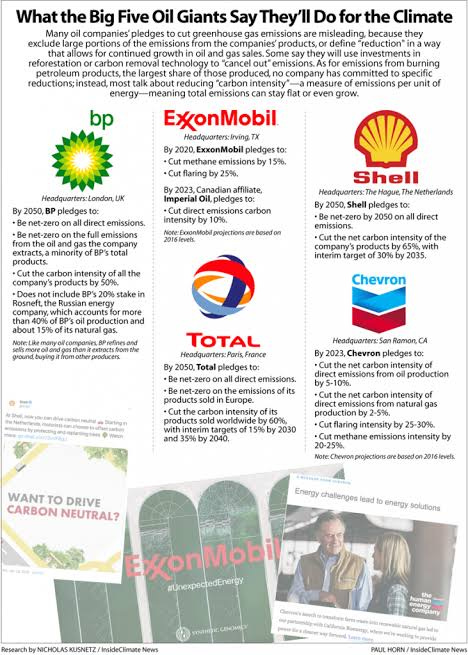Multinational companies as "Mothers of lack of integrity" on Global Warming
Multinational companies always pledge to keep greenhouse gas emissions in tune with the Paris global warming targets. Why do they break their promises?
Credit, Inside Climate News
Earlier in the week, reports emerged that twenty-four multinationals reneged on playing their part in decarbonising the global economy, despite endorsing the Paris treaty target of capping global warming at 1.5 degrees Celsius, with eleven companies found to have “low integrity” and four – American Airlines, Samsung Electronics, retail food giant Carrefour, and JBS – tagged with “very low integrity.”
A few days before this development, Shell delivered a record $40 billion profits in 2022, capping a year in which surges in energy prices from Russia’s invasion of Ukraine made the company make more than double earnings from a year earlier, fuelling fears that the refusal of fossil fuel companies to play their part in decarbonising the global economy could worsen effects of climate change.
Also, LEK Consulting surveyed 400 global executives of companies in a range of industries, including 28 percent with annual revenues of over $10 billion, and discovered that 58 percent of these organisations remain unable to decide what their trade-offs should be towards decarbonising the global economy.
The climate change episode in the near future could be complicated, if global companies remain undecided about the trade-offs necessary towards decarbonising the global economy, or if companies such as Shell continue making monster profits in fossil fuel sales, or if multinational companies persist to renege on their pledges despite endorsing the Paris treaty target on capping global warming at 1.5 degrees Celsius.
U.S. oil company Exxon revealed recently that it earned a profit of $56 billion in 2022, the highest figure on record for any public-traded oil company; while Chevron’s profits topped $35 billion for 2021, more than doubling the $15 billion from the year before, while British major BP raked in just shy of $28 billion, the highest total in the company’s 114-year history.
In the third quarter of 2022, Korean consumer electronics company Samsung recorded an operating profit of nearly $8.2 billion; while American Airlines reported a fourth-quarter and full-year profit of $803 million and $127 million respectively, with the fourth-quarter revenue of $13.2 billion representing a 16.6 percent rise over same period in the year before; while French food retailer Carrefour Group reported a fiscal 2022 net income of 1.35 billion euros, up 26 percent from last year’s 1.07 billion euros.
As for JBS worldwide, the company recorded a revenue amounting to $65 billion; while Volkswagen, one of the companies refusing to meet its climate change commitments, recorded earnings of 22.5 billion euros, at the higher end of the 7-8.5 percent margin it had forecast in March 2021, with Amazon, another culprit, increasing net sales by 9 percent to $514 billion in 2022, compared with $469.8 billion in 2021.
Rather than prioritize their commitments to global warming targets, companies such as Amazon focus on their net sales or profits recorded through their transactions, and the pattern could be seen in the rising fortunes of Samsung, American Airlines, and Carrefour, with Exxon, Chevron, and BP also guilty of the trend, focusing on profits rather than capping global warming at 1.5 degrees Celsisus.
Global banks provided $742 billion in the financing of coal, oil, and gas companies last year, with the world’s largest 60 lenders giving a little less money for fossil fuel transactions in 2021 than the year before, which had $750 billion flowing into dirty energy, as JP Morgan Chase, Citi, Wells Fargo, and Bank of America contributed one quarter of all fossil fuel financing in the past six years.
While Chevron pledged to reduce absolute gas emissions by 40 percent by 2030 and Shell declared commitments to zero carbon emissions by 2050, they dedicated only 0.2 percent and 1 percent respectively of investments to low carbon sources.
United Arab Emirates suggested that 12 percent of energy will come from clean coal, but the plan relies on carbon capture and storage (CCS) technologies to continue the practice of fossil fuel infrastructure, and this has been the case with all big polluters.
Global warming figures could escalate if the big polluters the world over sing the tune of carbon capture and storage technologies as a way to dodge their commitments to climate change targets, and global banks such as J.P. Morgan Chase, Citi, Wells Fargo,and Bank of America could worsen the situation through their financing, which accounts for the low percentages recorded by Chevron and Shell in investments to low carbon sources.
Countries representing 91 percent of the global economy pledged net-zero commitments last year, rising from 68 percent the year before. Countries that represent 83 percent of global greenhouse gas emissions and having more than 80 percent of the world population also pledged net-zero targets, up from 61 percent and 57 percent last year. To get them to show real commitments, regulations need to show clarity about their involvement so the world doesn’t end up in flames through effects from climate change.
What to Eat
Canadian vegan diet, Credit, Narcity





